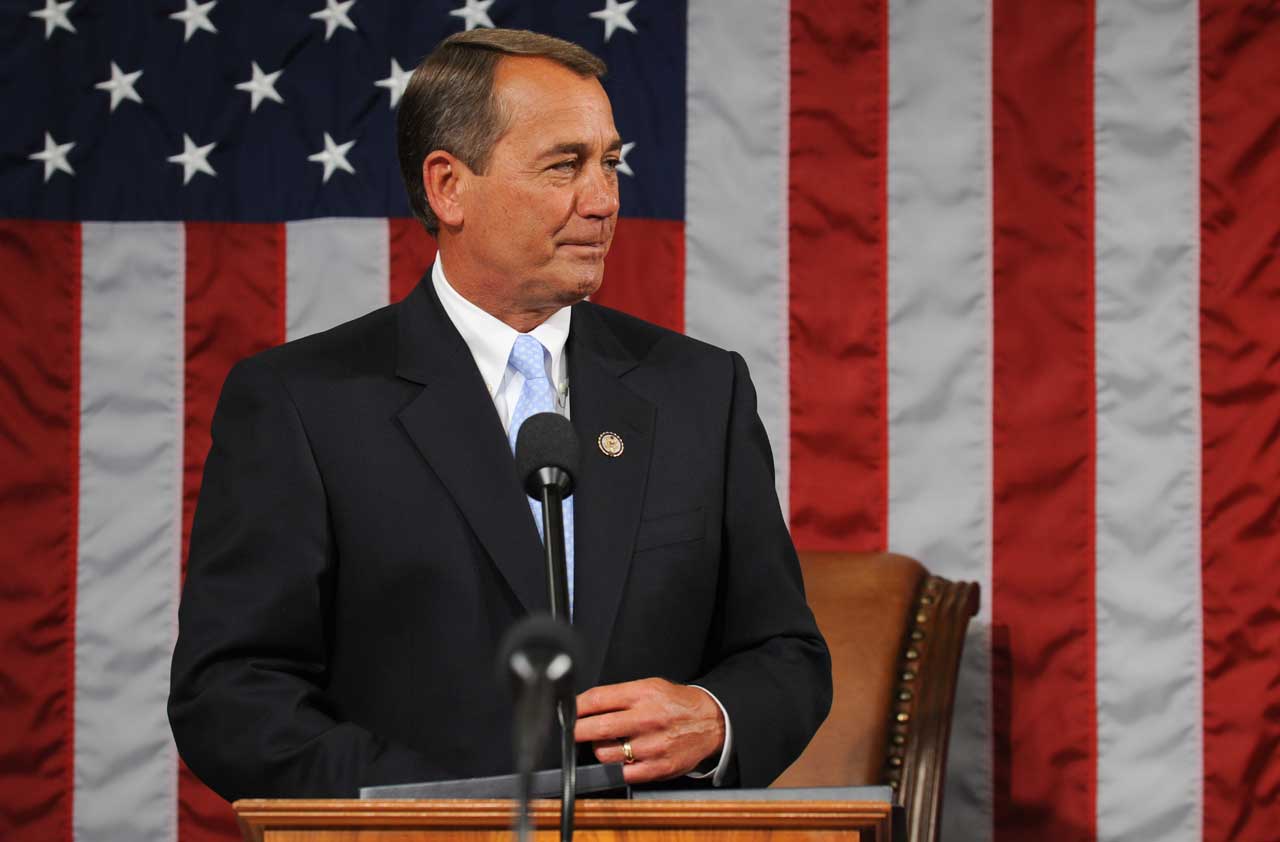Boehner’s Resignation Makes Government Shutdown Less Likely – For Now
Bigger fights over the federal budget are in store amid divided Republicans in Congress.


Profit and prosper with the best of Kiplinger's advice on investing, taxes, retirement, personal finance and much more. Delivered daily. Enter your email in the box and click Sign Me Up.
You are now subscribed
Your newsletter sign-up was successful
Want to add more newsletters?

Delivered daily
Kiplinger Today
Profit and prosper with the best of Kiplinger's advice on investing, taxes, retirement, personal finance and much more delivered daily. Smart money moves start here.

Sent five days a week
Kiplinger A Step Ahead
Get practical help to make better financial decisions in your everyday life, from spending to savings on top deals.

Delivered daily
Kiplinger Closing Bell
Get today's biggest financial and investing headlines delivered to your inbox every day the U.S. stock market is open.

Sent twice a week
Kiplinger Adviser Intel
Financial pros across the country share best practices and fresh tactics to preserve and grow your wealth.

Delivered weekly
Kiplinger Tax Tips
Trim your federal and state tax bills with practical tax-planning and tax-cutting strategies.

Sent twice a week
Kiplinger Retirement Tips
Your twice-a-week guide to planning and enjoying a financially secure and richly rewarding retirement

Sent bimonthly.
Kiplinger Adviser Angle
Insights for advisers, wealth managers and other financial professionals.

Sent twice a week
Kiplinger Investing Weekly
Your twice-a-week roundup of promising stocks, funds, companies and industries you should consider, ones you should avoid, and why.

Sent weekly for six weeks
Kiplinger Invest for Retirement
Your step-by-step six-part series on how to invest for retirement, from devising a successful strategy to exactly which investments to choose.
House Speaker John Boehner’s surprise decision to quit lessens dramatically the chance of a federal shutdown next week.
Boehner, no longer needing to worry about his political future, can ignore conservative Republicans who want to block government funding for Planned Parenthood and pass a budget with the help of House Democrats and a relative handful of Republicans by the time the new fiscal year starts Oct. 1.
Before the Ohio Republican’s announcement this morning, a shutdown seemed imminent. A budget that eliminated money for Planned Parenthood would have been blocked in the Senate or been vetoed by President Barack Obama, leaving the government with no money to keep nonessential programs operating.
From just $107.88 $24.99 for Kiplinger Personal Finance
Become a smarter, better informed investor. Subscribe from just $107.88 $24.99, plus get up to 4 Special Issues

Sign up for Kiplinger’s Free Newsletters
Profit and prosper with the best of expert advice on investing, taxes, retirement, personal finance and more - straight to your e-mail.
Profit and prosper with the best of expert advice - straight to your e-mail.
But Boehner’s move merely delays the inevitable. Barring more surprises, the new spending agreement will expire in December. That sets up another budget fight that will overlap with the need to raise the federal debt ceiling and a vote to reauthorize the Export-Import Bank.
And lawmakers will have to do it all over again about this time next year, just ahead of the presidential election to determine Obama’s successor.
No matter who replaces Boehner, GOP infighting won’t cease. The next speaker will still be on a tightrope, trying to appease both pro-business Republicans and the more strident, more vocal tea party types.
So a shutdown remains likely at some point, though it will now probably occur later rather than sooner. When it does happen, most of the blame will fall on Republicans, much to the delight of Democrats and to the dismay of many Republican lawmakers and officials. But others in the GOP welcome a prolonged argument over the party’s future, even if it undercuts Republican chances of winning the White House next year.
When the smoke finally clears, a short-term agreement on the budget will boost federal spending for both defense and domestic programs. The spending caps of sequestration, which led to deep cuts in recent years, remain on the books, but they’ll be breached--if not next month, then later this year, when Congress looks to settle spending through Sept. 30, 2016.
The extra money will help some businesses, especially defense contractors and the legions of subcontractors that scramble for slices of nearly every government project. But the uncertainty over spending in the coming year will sow confusion and might result in job losses. If the Export-Import Bank isn’t renewed, for example, some U.S.-based companies say they will move thousands of jobs to facilities in Europe or elsewhere.
The longer Congress goes without passing a full-year budget, the more power it cedes. The short-term resolutions that have become standard in recent years allow spending priorities to be shaped by bureaucrats who have some authority to move money around inside federal agencies.
Those temporary funding measures won’t end until Obama leaves office. The political atmosphere is too poisoned, and the presidential election is too close on the calendar.
A new speaker – possibly House Majority Leader Kevin McCarthy (R-CA), the current number two – won’t speed up that process.
Senior Associate Editor Richard Sammon and Associate Editor Pamela M. Prah contributed to this report.
See Our Slide Show: 11 Common Medicare Mistakes
Profit and prosper with the best of Kiplinger's advice on investing, taxes, retirement, personal finance and much more. Delivered daily. Enter your email in the box and click Sign Me Up.

-
 How Much It Costs to Host a Super Bowl Party in 2026
How Much It Costs to Host a Super Bowl Party in 2026Hosting a Super Bowl party in 2026 could cost you. Here's a breakdown of food, drink and entertainment costs — plus ways to save.
-
 3 Reasons to Use a 5-Year CD As You Approach Retirement
3 Reasons to Use a 5-Year CD As You Approach RetirementA five-year CD can help you reach other milestones as you approach retirement.
-
 Your Adult Kids Are Doing Fine. Is It Time To Spend Some of Their Inheritance?
Your Adult Kids Are Doing Fine. Is It Time To Spend Some of Their Inheritance?If your kids are successful, do they need an inheritance? Ask yourself these four questions before passing down another dollar.
-
 Kiplinger's 2020 Election Forecast
Kiplinger's 2020 Election ForecastPolitics For nearly a century, The Kiplinger Letter has forecasted the outcome of presidential elections to keep readers informed of what's coming and what it means for them. Here's our call for 2020.
-
 How the GOP Tax Bill May Affect Businesses
How the GOP Tax Bill May Affect BusinessesBusiness Costs & Regulation Corporations would enjoy a lower flat tax rate while individual owners of pass-throughs would also see a lower rate, but with more complex terms.
-
 The Long Slog in Congress After Comey
The Long Slog in Congress After ComeyPolitics Trump's firing of the FBI director ruffled congressional feathers, but not enough to spur an independent investigation into Russian meddling in the 2016 U.S. election.
-
 Trump’s Tax Reform Plan Faces Tough Challenges
Trump’s Tax Reform Plan Faces Tough ChallengesPolitics A one-page outline isn't enough to satisfy a Congress interested in the details — and protecting constituents.
-
 Trump's Agenda and Challenges
Trump's Agenda and ChallengesPolitics What lies ahead for the President-Elect.
-
 Clinton on Track to Win 2016 Presidential Election
Clinton on Track to Win 2016 Presidential ElectionPolitics Trump can win the White House, but faces an uphill climb.
-
 New Overtime Rules Will Hit Businesses This Year
New Overtime Rules Will Hit Businesses This YearBusiness Costs & Regulation A change in salary threshold will make more workers eligible for extra pay.
-
 Bumpy Road Ahead in 2016 Presidential Race
Bumpy Road Ahead in 2016 Presidential RacePolitics Trump will get a bounce after the Republican convention, but Clinton is poised to regain ground.